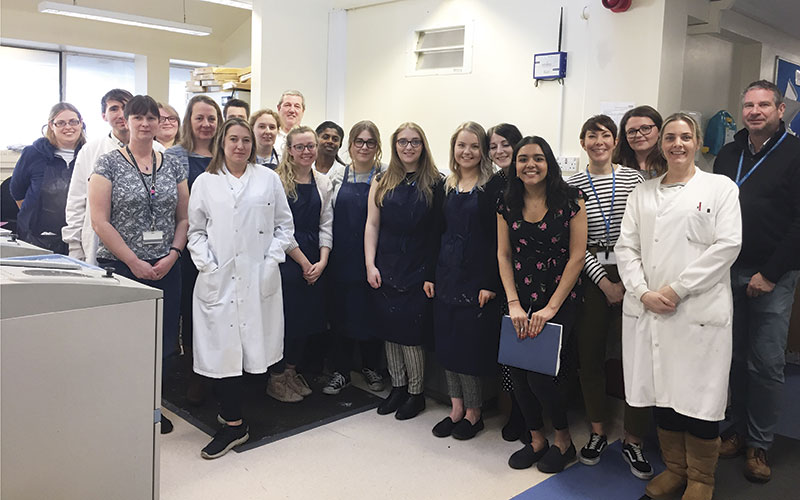My Lab: Molecular Pathology Services

My laboratory, a fully ISO-accredited laboratory, is located at the top of the South West in the regency spa town of Cheltenham. Together the two large general hospitals of Cheltenham General Hospital and Gloucester Royal Hospital, make up Gloucestershire Hospitals NHS Foundation Trust, serving the ~900,000 inhabitants of Gloucestershire. The pathology services run from both sites; the histopathology department is mainly based at Cheltenham, with a smaller hot lab at Gloucester for frozen and renal biopsies.
Receiving over 40,000 specimens per year from 82 GP surgeries across the region, in-patient and out-patient clinics and theatres from both general and outlier hospitals within the area, the department is one of the largest in the South West region. To ensure timely arrival of specimens, the pathology department has a fleet of vans transporting samples the eight miles between the two sites and visiting GP surgeries and outlier hospitals daily. A shuttle bus transports passengers and staff between the two hospital sites.
We have a large multi-professional team of 68 staff, consisting of 24 biomedical and clinical (healthcare) scientists, 15 consultant pathologists, 14 medical laboratory assistants and 15 administration and clerical staff. Our laboratory performs standard dissection, microtomy and special stains and is complemented by a comprehensive immunohistochemistry (IHC) repertoire. Scientist staff are trained and work flexibly across all areas of the laboratory, rotating on a two-week basis. We also perform frozen sections and immunofluorescence and offer a renal biopsy attendance service.
In addition to managing the HER2 service, my role is to develop, organise and manage the provision of modern molecular pathology services. The special techniques section houses four BenchMark ULTRA platforms (Roche/Ventana), which perform IHC, chromogenic/silver in-situ hybridisation and dual colour dual probe in-situ hybridisation techniques, providing in-house services for diagnosis, monitoring and predictive profiling. Most recently, rapid testing for the presence of mutations to guide therapy decisions in melanoma and colorectal cancer using the Idylla™ platform (Biocartis) is in the process of being implemented. These tests will further strengthen the delivery of personalised medicine in a timely and effective manner to the patients in our region.
As an IBMS-accredited training laboratory, we are committed to training at all levels, with trainees completing a variety of training portfolios, including apprenticeship, biomedical scientist registration, Specialist Portfolio, Diplomas of Expert Practice and Biomedical Scientist Reporting. We collaborate with the University of the West of England and Griffith University Gold Coast in Australia, giving students the invaluable opportunity to train and gain experience within the laboratory as part of their undergraduate degrees.
In addition to myself, there are now a further two HCPC-registered clinical scientists within the department, each
of us having taken very different journeys to registration; one of our scientists has recently completed the Scientist Training Programme in Cellular Sciences, whilst another has successfully undergone equivalence with the Academy for Healthcare Science.
Siobhan is the current recipient of the Chief Scientific Officer Women in Science and Engineering Fellowship.
